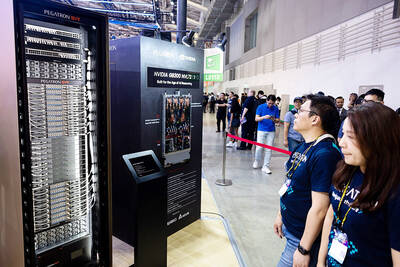Delta Electronics Inc (台達電) yesterday announced that it is to cooperate with Microsoft Corp in various domains as the company looks to implement a digital transformation.
“We are currently using Microsoft’s hybrid cloud platform, Azure, to predict and monitor our different business segments,” Delta Electronics information technology division chief information officer Cally Ko (柯淑芬) told a news conference in Taipei.
Under the partnership, Microsoft would also handle data that Delta Electronics has gathered throughout its daily operations, Ko said.
Microsoft Taiwan Corp general manager Ken Sun (孫基康) said that his company would provide Azure real-time execution data box edge services to Delta Electronics at all the firm’s manufacturing plants.
“Data is the future fossil fuel, which needs to be managed and protected … and we have a lot of it from our production sites, and logistics and client information,” Delta Electronics chairman Yancey Hai (海英俊) said.
Delta Electronics is looking to complete a digital makeover as it looks to reposition itself as a software firm, he said.
“We have set up two AI [artificial intelligence] projects with Microsoft’s headquarters in the US... One is aimed at improving the efficiency and noise cancelation of our ultra-thin fans, the other is focused on developing a product quality management system,” Hai said.
Delta Electronics would be hosting members of Microsoft’s engineering team at its Taipei headquarters in the next six months, he said.
The company is also planning future collaborations with Microsoft in areas such as machine deep learning at its robotics arm with the aim of improving the industrial automation business, he added.
Operating profit at Delta Electronics’ automation business declined 36.45 percent last quarter.
Despite that, the company posted revenue of NT$24.31 billion (US$783.31 million) last month, a 13.32 percent year-on-year increase and the company’s fifth consecutive double-digit percentage growth in revenue.
Cumulative revenue in the first eight months rose 17.08 percent year-on-year to NT$176.52 billion, company data showed.

AI TALENT: No financial details were released about the deal, in which top Groq executives, including its CEO, would join Nvidia to help advance the technology Nvidia Corp has agreed to a licensing deal with artificial intelligence (AI) start-up Groq, furthering its investments in companies connected to the AI boom and gaining the right to add a new type of technology to its products. The world’s largest publicly traded company has paid for the right to use Groq’s technology and is to integrate its chip design into future products. Some of the start-up’s executives are leaving to join Nvidia to help with that effort, the companies said. Groq would continue as an independent company with a new chief executive, it said on Wednesday in a post on its Web

RESPONSE: The Japanese Ministry of Finance might have to intervene in the currency markets should the yen keep weakening toward the 160 level against the US dollar Japan’s chief currency official yesterday sent a warning on recent foreign exchange moves, after the yen weakened against the US dollar following Friday last week’s Bank of Japan (BOJ) decision. “We’re seeing one-directional, sudden moves especially after last week’s monetary policy meeting, so I’m deeply concerned,” Japanese Vice Finance Minister for International Affairs Atsushi Mimura told reporters. “We’d like to take appropriate responses against excessive moves.” The central bank on Friday raised its benchmark interest rate to the highest in 30 years, but Bank of Japan Governor Kazuo Ueda chose to keep his options open rather than bolster the yen,

Even as the US is embarked on a bitter rivalry with China over the deployment of artificial intelligence (AI), Chinese technology is quietly making inroads into the US market. Despite considerable geopolitical tensions, Chinese open-source AI models are winning over a growing number of programmers and companies in the US. These are different from the closed generative AI models that have become household names — ChatGPT-maker OpenAI or Google’s Gemini — whose inner workings are fiercely protected. In contrast, “open” models offered by many Chinese rivals, from Alibaba (阿里巴巴) to DeepSeek (深度求索), allow programmers to customize parts of the software to suit their

Global server shipments are expected to surge to 15 million units next year, from 4 million units this year, with artificial intelligence (AI) servers accounting for about 30 percent, driven by massive capital spending by major cloud service providers, the Market Intelligence and Consulting Institute (MIC) said on Thursday last week. Major cloud service providers — including Google’s parent company Alphabet Inc, Microsoft Corp, Amazon.com Inc and Meta Platforms Inc — are projected to budget US$450 million for capital expenditure next year, up from US$400 million this year, MIC ICT [information and communications technology] Industry Research Center director Edward Lin